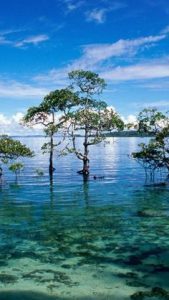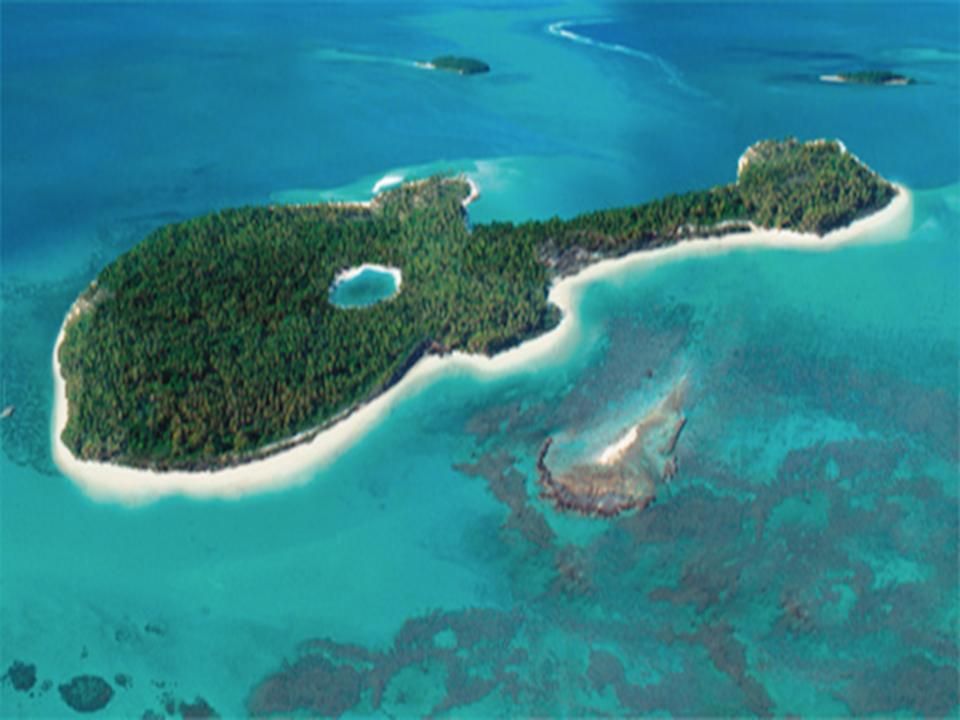Bhutan’s concept of GHP (Gross National Happiness) involves measuring prosperity based on a broad range of factors including spiritual, physical, social and environmental health of its citizens and natural environment. Radhika debates for a similar happiness index for the A&N Islands, exclusively for Different Truths.
 Eight years ago, in February 2010, as I was surfing the Internet at my New Delhi home, I read about Boa Sr of the Bo tribe from the North Andaman Island and how she was the last remaining speaker of the Bo language. I looked at her face looking right back at me through the screen and I felt her loneliness. She belonged to one of the oldest tribes on Earth, with her died a thousand secrets of her people and their lives on the islands. This is a reminder that the threat of extinction looms large for the tribal people of Great Nicobar too.
Eight years ago, in February 2010, as I was surfing the Internet at my New Delhi home, I read about Boa Sr of the Bo tribe from the North Andaman Island and how she was the last remaining speaker of the Bo language. I looked at her face looking right back at me through the screen and I felt her loneliness. She belonged to one of the oldest tribes on Earth, with her died a thousand secrets of her people and their lives on the islands. This is a reminder that the threat of extinction looms large for the tribal people of Great Nicobar too.
With the loss of biodiversity, habitats, and native languages, we also lose indigenous knowledge, including the traditional ecological comprehension of the role of species and landscapes that native communities had kept alive for eons.
With China as a looming threat in the Indian Ocean, India plans to augment its military capability here to safeguard its interests in the Bay of Bengal and Indian Ocean.
‘Modernisation’ poses still more dangers. The archipelago is separated by over 650 nautical miles from the Indian mainland and offers a vital geostrategic advantage to India and this places it at risk from further economic and defence development. With China as a looming threat in the Indian Ocean, India plans to augment its military capability here to safeguard its interests in the Bay of Bengal and Indian Ocean. Translated, this means more infrastructure, more inappropriate (from a biodiversity point of view) technological intrusions, such as upgradation of the naval air station at Campbell Bay.
Easy accessibility is inevitably followed by economic invasion. The vast Exclusive Economic Zone (EEZ), around this zone accounts for almost 30 per cent of India’s entire EEZ. What further complicates this threat to the biological existence of plant and animal lifeforms is the fact that the A&N Islands sit astride some of the busiest shipping lanes of the Indian Ocean. Facilities are being mooted to build new capacity for cargo to be transported to East Asian economies to cater to Indian interests by using the strategically-located mouth of the Malacca Straits. This gateway to the Far East is an 850 km channel and carries 40 per cent of the world’s freight trade, which annually sees over 94,000 merchant ships sailing to and from China, South Korea and Japan alone.
Marine debris already lines the pristine beaches of Great Nicobar, threatening the breeding grounds of leatherback turtles
The subsequent land use change and impact on biodiversity and culture in the  A&N Islands has been evident in the last few years, specially post tsunami. There are plans underway for up-scaled, integrated tourism and enhanced infrastructure. Marine debris already lines the pristine beaches of Great Nicobar, threatening the breeding grounds of leatherback turtles, their hatchlings and other marine life. In all likelihood, humungous quantities of marine plastic debris originate from fishing or mariculture activity… and from irresponsible ship traffic. The wheels of change for Great Nicobar and other parts of the A&N Islands are in motion, and it will take a visionary, great balancing act to protect this wonderland.
A&N Islands has been evident in the last few years, specially post tsunami. There are plans underway for up-scaled, integrated tourism and enhanced infrastructure. Marine debris already lines the pristine beaches of Great Nicobar, threatening the breeding grounds of leatherback turtles, their hatchlings and other marine life. In all likelihood, humungous quantities of marine plastic debris originate from fishing or mariculture activity… and from irresponsible ship traffic. The wheels of change for Great Nicobar and other parts of the A&N Islands are in motion, and it will take a visionary, great balancing act to protect this wonderland.
Increasingly, there has been recognition that measurements such as GDP (Gross Domestic Product) do not capture the overall wellbeing of a nation’s citizens. It’s hard to not be impressed by the motivations behindBhutan’s concept of GHP (Gross National Happiness) for its people. This involves measuring prosperity based on a broad range of factors including spiritual, physical, social and environmental health of its citizens and natural environment. Environmental conservation and sustainability are at the heart of Bhutan’s political agenda, which stems from an intrinsic belief that happiness is dependent on well-being that in turn results from close contact and balance with nature.
Islands, including the Andaman and Nicobar Islands, are specially well placed to adopt such a system of measuring prosperity. Island nations world over have a higher than average level of life expectancy, life-satisfaction and a lower-than-average ecological footprint when calculated on the lines of the Happy Planet Index (HPI). Perhaps geographical isolation from the mainland protects locals from mainland disturbances and helps them retain their unique cultural, ecological and social values.
A Gross Island Happiness Index for these islands would be a shining example for the rest of our country, indeed the world to emulate.
Maintaining ecological, social and cultural balance for the A&N Islands is very much in line with UNESCO’s vision for the Great Nicobar Biosphere Reserve. A Gross Island Happiness Index for these islands would be a shining example for the rest of our country, indeed the world to emulate.
For now, the Great Nicobar Island waits patiently for its story to unfold. Even as the tussle between human greed and nature continues, the islands happen to be among the most biodiverse places on the planet, teeming with life forms. All these, however, remain at the mercy of one species searching for gratification in all the wrong places.

©Radhika Bhagat
Photos from the Internet





 By
By
 By
By
 By
By